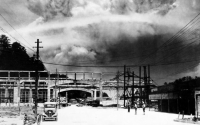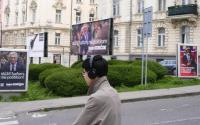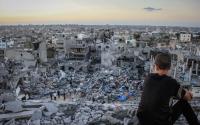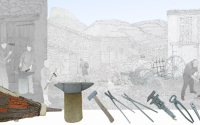Euan FergusonSunday December 23, 2001The ObserverSeptember Apart from one burst of frenetic joy - England's 5-1 victory over Germany in Munich, the month seemed to start incredibly slowly. Somalian tax-collectors went back to work for the first time in 10 years. An organ piece by John Cage began its recital in Germany, the idea being to play a few notes every year: it's scheduled to finish in 639 years. Unless there's an interval.
Then, suddenly, the Western world was told to prepare itself for Armageddon; a disaster of cosmic proportions. The eruption of a volcano in the Canaries would, we were told, create a tsunami which could wipe out most of America and Europe. When it erupted, some time over the next 200 years. If it erupted. Maybe.
More than 400 refugees, who had been rescued by a Norwegian freighter, the Tampa, when their boat sank as they fled Taliban rule in Afghanistan, were refused sanctuary in Australia, leading to angry international debate about the lives and legitimacy of refugees; life under the Taliban, said a number of incredulous Australian commentators, surely couldn't be that bad.
In Belfast, a bomb was thrown at four-year-old children trying to make their way through a screaming mob to Holy Cross school in Ardoyne.
On 10 September, 2001, the front page of London's Evening Standard was filled with the news that Kate Winslet had denied canoodling with someone somewhere. On that same day, the headline in the New York Daily News was 'Kips Bay Tenants Say: We've Got Killer Mold'.
'... There would be a piece of concrete the size of an alarm clock, then I would turn around and there would be a piece the size of a desk. There were bodies, luggage, torsos. I've seen maybe a million movies where people are falling and it's always, like, choreographed, but this was really ugly. It looked like lemmings, people lining up and dropping, too many people falling. Then something landed right next to me and I went back inside. There were dying people. There was this guy who had no skin left. And as I was walking past him he took two short breaths - like "Hah hah" - and then he stopped, and then he froze up like the concrete all around him... '
A thousand, 10,000 tales, Kirk Kjeldsen's only one among them. The financial reporter was quoted in the New Yorker's rush edition. He had fallen asleep on the subway on his way to work in the World Trade Center and was about to enter the ground-floor lift when the first plane hit; it felt, he said, 'like the building got snapped by a towel'.
It was, it is, the biggest story of our times, the greatest hatred of our times: as the commentators said then, in words that turned out, unusually, to be far from hyperbolic, it was the day that changed everything.
The north tower of the World Trade Center was hit at 8.48am Eastern Standard Time by American Airlines Flight 11, a Boeing 767 with 92 passengers on board, hijacked from Boston. The south tower was hit 15 minutes later by United Airlines Flight 175, also hijacked from Boston. At 10.05, the south tower collapsed. At 10.29, the north tower joined it. By this time AA Flight 77 had been flown into the Pentagon, crashing at 9.40. At 10.03, just before the south tower's collapse, United Airlines Flight 93, bound from Newark to San Francisco, crashed in Pennsylvania: four passengers are understood to have overcome the hijackers and forced it down. In Nablus, they danced.
Latest figures have 2,508 confirmed dead in New York, and 484 missing, 77 of the total being UK nationals. In Washington, 125 have been confirmed dead. The slaughter was carried out by 19 hijackers, led by Mohamed Atta.
We know so much of the rest. We have read so much, we have watched so much and argued so much, and it would be pointless to rehash all the tales from that first week. There will be books, films, poems; there are a million testimonies to the pain and bravery of that first week in America. In hindsight, it seems pointless to focus on one incident or one trauma, for we all watched everything unfold, time and again, and we know what were our own, private thoughts. More usefully perhaps, we can remember the way the story developed from that day on.
The first week was one of simple shock at so many dead, and the manner of their death. Hardly a voice was raised, then, against American foreign policy; even those used to assailing the superpower for the damage it had thoughtlessly wrought elsewhere - the sanctions destroying the lives of so many children in Iraq, the thousands of civilians killed by Israel - grew sombre and silent while they tried to grasp the scale of what had happened.
Here, Tony Blair postponed his TUC speech, and William Hague postponed the Tory leadership announcement (Iain Duncan Smith won, by the way). Parliament was recalled within days. Attacks began on Muslims in Britain. Tony Blair flew to Berlin, Paris, Washington, New York and Brussels, and spoke to more than two dozen heads of state, winning support for a broad coalition backing what George Bush had called a 'war against terror', and trying to offer reassurances, along the way, that the West did not want a war against Islam, simply against terror.
As eyes focused on Osama bin Laden , al-Qaeda and the Taliban, Bill Clinton admitted he had ordered bin Laden's assassination five years earlier but US intelligence - now being shown to be hopelessly flawed - hadn't been able to find him.
Afghans began fleeing the country, as it became clear that America, with mainly British support, was going to attack. The Taliban ordered poppy farmers to start growing again and flood the West with opium. Israel and Palestine were forced into an itchy and short-lived ceasefire. America secured uneasy Pakistani support for the forthcoming campaign, thanks in part to its having rescheduled $379m of debt. Most of the world was swift to condemn the atrocity, but Iran and Saudi Arabia wouldn't allow their airbases to be used in any war against Muslims, and Iran refused flyover permission.
America suffered, hugely. A 'new patriotism' began, with flags being worn throughout the nation: some retreated even further into insularity but others began wondering just what it had done to the world to deserve 11 September. In Britain, and elsewhere in Europe, there awoke fresh interest in what Islam was about, and what had been going on in the Middle East all that time (on the other channel, while we were watching Big Brother 2). There was talk of attacks on London. 'I'll nuke Britain, says evil Bin Laden,' shouted a Daily Express headline, prompting Alastair Campbell to wonder whether the real news we were getting just wasn't exciting enough.
Resilient New York began, slowly, to recover. People went out. Couples renewed their vows, divorce rates fell and firemen became the most desired sexual partners in the city. Some humour returned. As the satirical magazine The Onion had it: 'A shattered nation longs to care about stupid bullshit once more.' But New Yorkers were still wandering past, and smelling, the grimmest piece of earth on the planet, Ground Zero. On 20 December, 100 days on, they were still pulling out the dead.
At the Labour Party conference Tony Blair spoke of healing the world but also told the Taliban to 'surrender the terrorists or surrender power'. The speech was hailed in some quarters as Churchillian; it sounded, for once, truly and wholeheartedly meant.
Some other life, and death, went on. An inquiry began into the death of Victoria Climbié, possibly the most horrific case of child abuse in our legal history. An AA worker was sacked for altering the name in Tony Blair's computer details to 'Saddam Hussein - aka twatface', then finding he couldn't undo the damage. TV cameras generally respected Prince William's plea for privacy as he started at St Andrew's University - all except one. The fact that the intrusive journalism came from Ardent Productions, Edward's troubled baby, had the rest of the press hooting with delight at more foot-shootery from the Wessexes; Charles was said to be 'incandescent' with his brother.
October Attacks began on Afghanistan, with B52s and cruise missiles pounding this unknown and difficult land. The Taliban said early attacks were almost wholly ineffective, and vowed to fight on to the death. Rumours began that the West's immense sophistication was useless against a country that had already been effectively bombed back to the Stone Age. Critics who remembered various failed American forays abroad began warning of an ill-conceived plan of attack, and one which, moreover, would likely result in the deaths of many thousands of Afghan civilians unable to receive food aid as winter neared. Bombs killed a number of UN mine-clearers, and the 'aid bombs' were simply derided: yellow packages fluttering down all over Afghanistan containing peanut butter, tomato sauce and a napkin.
There were riots in Pakistan, and the British Muslim Council said it feared action was 'spiralling out of control.' A raid on 20 October on Janhagar airstrip, which looked effective on a grainy video, later turned out to have been shambles, with US marines ambushed and lucky to escape: they left behind one soldier's foot and half a helicopter.
America ignored all criticism, as it had new worries. Two cases of anthrax were found in Florida a week after a Briton died there from the disease, and soon packages containing spores were landing on the desks of newsreaders and senators. By the end of the month, 60 tons of post were lying unopened on Capitol Hill - but by that time it was being accepted that this was not organised terrorism but the homemade work of what the medical profession usually terms a 'wacko'.
Rehavam Zeevi, the Israeli Tourism Minister, was shot dead by a PFLP gunman, and a very fragile Middle East peace was over. On 18 October, Israeli forces began occupying the West Bank. Rudy Giuliani, fresh from an honorary British knighthood, turned down a £7m cheque, proffered by a Saudi prince for the city's relief efforts, when the prince asked for a 'more balanced' stance towards Palestine.
In Britain, Tony Blair was having a Very Good War. His whistlestop tours, his speeches and his winning-over of allies for George Bush were making him a fêted household name in America. Less so his colleagues. David Blunkett's plan to legislate against incitement to religious hatred was derided as a law against blasphemy and anomalous to traditions of scepticism and humour. And Stephen Byers, already under attack from the Conservatives for having refused, finally, to bail out Railtrack any more, thus effectively bankrupting it, was further vilified when it was revealed that one of his staff, Jo Moore, had sent out an email within minutes of the 11 September attacks suggesting to her fellow spinners that it would be a 'very good day' to ease bad government news into the public domain.
In New York, panhandlers began hawking 'souvenir ashes' at Ground Zero to the families of the dead.
Airlines began folding worldwide, the news was filled with bombs and grief, and into it all dropped the announcements, almost unheralded, that the IRA was, finally, about to decommission, and cannabis was going to be effectively decriminalised. I mean, you wait years for one story, then 67 come along at once...
At Old Trafford, David Beckham reminded us what joy was, with a last-minute equaliser against Greece which ensured England's progress and cemented his beatification.
V.S. Naipaul won the Nobel Prize for Literature, and Kofi Annan and the UN won for peace. Consignia - remember it? - said it would not now collect at advertised times from pillar-boxes which it thought were empty.
Journalist Yvonne Ridley was released by the Taliban and returned to something less than a heroine's welcome from columnists who panic if they have to drive outside Shepherd's Bush. Journalist Marie Colvin was honoured at the women of the year conference, an eyepatch covering the damage wrought by shrapnel in Sierra Leone. Prince Charles wore an eyepatch after catching some sawdust in the face.
November Ground Zero grew, impossibly, grimmer , as firemen began demonstrating, and fighting with police, as the number of people working in the ruins was reduced, meaning the bodies of victims, including many of their 'brothers', were simply being lifted piecemeal into the backs of trucks. It was estimated that 125,000 New York jobs had by now been lost because of 11 September, the bill stood at £55bn, and lawyers were gearing up for decades of action.
Osama bin Laden released a video in which his children perched on tanks and taunted America, saying the country had no real heroes, only Rambo.
And then, quite suddenly, the war was to all intents and purposes over. Mazar-e-Sharif fell to the Northern Alliance after being pounded by a relic from America's distant past, the 15,000-lb 'daisycutter' bomb, and within four days the Taliban had fled from Harat, too. And then, after a triumphant entry by John Simpson, who later apologised for having liberated it on behalf of the BBC, Kabul had fallen and the Northern Alliance re-entered the city they left in 1996 - when they also left behind 50,000 dead and an exuberant history of retributive sadism.
The nay-saying liberals who had warned of military failure were openly scorned. The normally sublime Christopher Hitchens began one article with the words: 'Well, ha ha ha, and yah boo'; the Sun called left-leaning critics the 'handmaidens of Osama bin Laden'. There was little hope, in the circumstances, of extended publicity over a ruthless massacre of Taliban supporters attempting to escape from jail in Mazar-e-Sharif. But the hunt still went on for Osama bin Laden, his whereabouts being harder to establish than the apparent fact that he has a very small penis.
Scotland's First Minister, Henry McLeish, resigned after he admitted receiving undeclared income of £36,000 for sub-letting part of his office in Fife. David Trimble was re-elected as Northern Ireland's First Minister, just, after two members of the non-sectarian Alliance party switched to save him.
Concorde flew again, carrying Tony Blair to Washington where he was hailed once more, famously revered and respected now by statesmen everywhere: he seemed almost as popular as Harry Potter, whose first film opened to universal delight. Revered except in Downing Street, where Gordon Brown had apparently started swearing at him as the relationship hit a new low, partly over contradictory hints on the Euro.
Consignia announced it wanted to abolish second deliveries and charge extra for deliveries made before 9.30am. Northern shoppers started boycotting Sainsbury's because they hated the soft southerner Jamie Oliver so much. Nigella went, briefly, blonde. Jonathan King was jailed for seven years after being found guilty of sexually abusing teenage boys.
American cheer at the Afghanistan successes was blighted by an all-too-close reminder of 11 September, when an Airbus carrying 260 people crashed shortly after take-off in New York. It was thought to have been too close to the vortex created by the preceding plane. Twelve plane-spotters were arrested in Greece on suspicion of spying, and John Howard won again in Australia, thanks in the main to his stern anti-asylum policy. Russia became the country with the fastest-growing Aids problem: it was estimated there were now 40 million sufferers worldwide.
December The focus moved from Afghanistan to Iraq, with President Bush making noises about the next target, to increasing international concern - although not from Iain Duncan Smith, who supported firm action against Saddam in a 45-minute meeting with Bush. They don't just share the same toothpaste, it turned out; they share the same tube.
Israel grew steadily angrier, a 53-year-old state lashing out like an adolescent. Thirteen Palestinians, including seven children, were killed in three days. Two Palestinians then shot dead and wounded 50 in Afula; suicide bombers exploded nail-filled bombs on Ben Yehuda Street in Jerusalem, killing 10, most of whom were teenagers, and injuring hundreds more. Israel sent helicopters against Yasser Arafat, whom the world was watching to see whether he could hold together the Palestinian Nation.
George Harrison died of lung cancer; the world paid tribute, particularly in Liverpool, where thousands lined the streets - even though half of them weren't even in the Beatles.
The jailing of Roy Whiting, found guilty of killing Sarah Payne in 2000, led to renewed calls for the so-called 'Sarah's Law', giving the public access to lists of local sex offenders; the News of the World named and shamed once more. And the Mirror took it upon itself to lead the charge against Lee Bowyer and Jonathan Woodgate, the Leeds players involved in the attack on Sarfraz Najeib, who walked free of all but the most minor charges, to general and extended disgust. Consignia, unsurprisingly, announced 30,000 lay-offs.
Kandahar, the Taliban's spiritual home, finally fell. Afghan casualties grew as the al-Qaeda labyrinths beneath the mountainous Tora Bora region were attacked, but still they yielded no bin Laden. From the West, the greatest number of casualties have been journalists, six of whom have now been killed. As frustrations grew, a surreal videotape was discovered in Kabul which purported to show bin Laden boasting of the 11 September massacre and the dreams which had preceded it; it swiftly became the most forensically studied tape since that made by Abraham Zapruder in 1963.
Yachtsman Peter Blake was murdered by pirates in the Amazon. David Blunkett suggested immigrants should make more of an effort to learn English. The Bank of Ireland gave away a quarter of a million punts to one customer when it mistook euros for pesetas.
As the year ended, and we braced for the next round of war, or terrorism, eyes looked back to America. In the end, the death toll from the Twin Towers was less than was first feared; there were 20,000 people working there when the planes hit, and it is remarkable how many did survive. But that's not, really, the point. We all watched those about to die begin jumping from windows; we all remain haunted by the shape of their last thoughts. That, truly, was terror, never to be forgotten: the terror inspired by the knowledge that one of the most powerful things a human being can do is rid himself of his humanity. Long after bin Laden is gone, long after the rest of this grim year is forgotten, that will remain.






